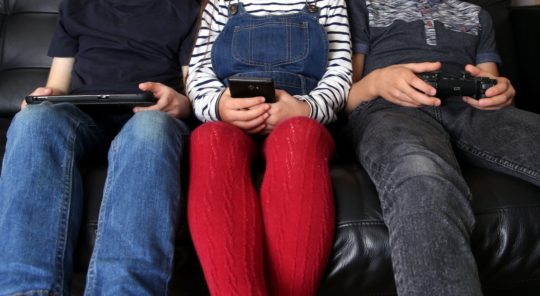Can you even remember before COVID? I’m sure there will be some term that we start to use that denotes before and after the pandemic. As I’m sure it has in many houses all over the world, Zoom. and Skype have become part of everyday use for catching up with family and friends and for work – screen time has become an essential part of our day and on a number of occasions we find ourselves on multiple screens at one time.
Parents and children alike have experienced Zoom-fatigue over the last 15 months – or perhaps yours was Teams-fatigue. Irrespective of the platform you may at times have felt like throwing your device out of the window on occasion when the technology lets you down and what worked yesterday no longer works today! Indeed, for most of us it has been a love/hate experience, but it has enabled us to connect with family and friends and without it this period would have been more difficult.
For our young people, already device savvy, screens and technology became even more important- their devices now powered all their interactions; friendships, lessons and entertainment and we, as parents, were introduced to TikTok, Houseparty, SnapChat along with Among Us, Roblox, Minecraft… the list went on. Surely this was good, this was positive – in a time when we were being told to stay indoors our creative and resourceful young people found ways to keep themselves connected and entertained. If any of you survived lockdown without screens, we salute you! If screens were a helpful distraction for your children and teens while you tried to work and juggle home-schooling – again we salute you.
So, while any positive interactions are good and create a nice shot of serotonin – which helps us be calmer, happier and more in control – were our children getting what they needed? Well, in a way, in the moment they were, but it also has a detrimental effect too. While playing computer games, which of course are created to hook them in, can be fun and exciting, dopamine kicks in keeping them motivated and recognising the activity as pleasurable – later when your child thinks about the gaming they get a dose of serotonin and the brain links gaming with being happy. And this is when our children begin to like gaming more than just talking to their friends.
This combination of happy chemicals in the brain gets triggered and reinforced each time they play and increases their desire, or even need, to play again. That might have helped us all get through lockdown but what now? Lockdown has lifted and our children are back face to face. This is good, it’s what we’ve all been waiting for. But just like us, they are out of practice.
In December of 2019 a National Literacy Trust survey of over 4,000 11-16 year-olds reported that “gaming helps them to build social connections both in ‘real life’ and online” – of course, what we didn’t know was that in a few short months the majority of those social connections were ONLY going to be online.
The Youth Fairies have noticed that recently many young people are expressing that they are struggling with making conversation since lockdown restrictions have significantly lifted. Particularly “small talk”, those conversations you have walking to school or between lessons with friends. Where they had come to rely on online connections through game play, zoom etc, they are now having to connect face-to-face – their brains were lighting up with dopamine while they were gaming and commenting on the gameplay and that stimulus is now often absent. The neuropathways created and reinforced in their brain during lockdown changed the way many communicate; in a way they are now having to re-learn those skills. So how can we help as parents?
- Name it and model it – let them know that you are finding it difficult in some of your interactions also, that you are feeling a bit out of practice and explain what you do that helps. Ask them if they are finding it challenging and be curious about anything is helping them that you can learn from.
- Give them opportunities to ‘just be’ with you – no pressure to have deep conversations but just be in each other’s company. Help create opportunities for them to do the same with friends and family.
- Practice “small talk” around the dinner table. It’s a great opportunity to share what’s been good about your day and a practice we encourage with The Youth Fairy families – go around the table and share 2 or 3 things each that has been good about your day.
- Open discussion around gaming and screen time and agree boundaries – ask questions about the negatives and positives and agree some family rules. (Watch out though, you may find them challenging your screen time to!).
- Recognise that there are some benefits and rewards for them in gaming or communicating through other media whilst helping them to enjoy spending time face to face once again.
It’s worth also pointing out that for many of our children messaging or texting has become the primary means of communication, here we lose tone and other subtleties of two-way conversations. This communication at a distance, can also make us bolder, remove some inhibitions and some social niceties – we might find ourselves wiling to say some things we wouldn’t say in person, either in being more open and sharing more personal information than we would ordinarily or perhaps be more willing to speak our mind, there’s some perceived safety in that distance. Again, modelling the behaviour that we are looking for and encouraging positive dialogue can help to reinforce the social norms that are expected when we are actually talking face to face again.




